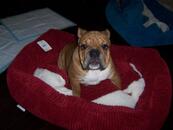lconceicao7
New member
Hi all,
Fletch 14 month male English bulldog has been diagnosed with idiopathic epilepsy. He spent one night last week on the night of his first seizure in the emergency Vet. There they took blood, prescribed him anti-convulsants and monitored for 24 hours. It’s been 5 days, and no seizures on the meds.
Last night, after hours of pacing and panting and disorientation, we brought him back to the ER Vet. The doctor on call there does not believe his symptoms to be related to epilepsy but definitely nueroglogical. On arrival he had a fever, diarrhea and vomiting.
They discharged him after running blood which was normal , glucose normal , and fever coming down. Now he is home at 5am and still restless. We do not know what to do , feeling very helpless.
Med: KEPPRA 500mg every 8 hours
Med: Zonisamide 100mg every 12 hours
Med: transderm (ear infection) 5 days through tomorrow.
Fletch 14 month male English bulldog has been diagnosed with idiopathic epilepsy. He spent one night last week on the night of his first seizure in the emergency Vet. There they took blood, prescribed him anti-convulsants and monitored for 24 hours. It’s been 5 days, and no seizures on the meds.
Last night, after hours of pacing and panting and disorientation, we brought him back to the ER Vet. The doctor on call there does not believe his symptoms to be related to epilepsy but definitely nueroglogical. On arrival he had a fever, diarrhea and vomiting.
They discharged him after running blood which was normal , glucose normal , and fever coming down. Now he is home at 5am and still restless. We do not know what to do , feeling very helpless.
Med: KEPPRA 500mg every 8 hours
Med: Zonisamide 100mg every 12 hours
Med: transderm (ear infection) 5 days through tomorrow.




